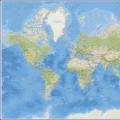Russia is one of the ten largest countries in the world in terms of population. The latest census, which was conducted in 2010, shows that the country is home to over 142 million people.
Organized compact living of people forms settlements. Their main types, presented in Russia, are a city, an urban-type settlement, a village, a village, a stanitsa, a khutor, aul. The formation of settlements is due to many reasons. Initially, settlements appear in territories with the most favorable climatic and relief conditions, industrial and economic potential.
Russia is a country with rather harsh climatic conditions, which, of course, primarily affects the formation of a system of settlements. The most densely populated territory of the Russian Federation is the central part.
Another factor affecting settlement is the industrial potential of the territories. Taking into account the fact that the main deposits of minerals in Russia are located in its northern territory, it is this part of the country that is the most industrially developed region with a fairly high population density.
Consider the types of settlements in the Russian Federation.
Towns and villages
What types of settlements are there? All settlements in the Russian Federation are subdivided into urban and rural, which reflects the main type of employment of people.

The dominant population of the Russian Federation lives in the city. This fact can be explained by both social and material reasons. Cities are predominantly centers of civilization with a developed infrastructure, the presence of cultural and social facilities, and more comfortable living conditions in comparison with rural ones. It is these reasons that cause the outflow of the rural population from the hinterland and practically the extinction of small rural settlements.
This process of the dominance of cities over villages is called urbanization. Primarily cities in Russia were industrial centers that allowed starving peasants to survive. The development of these centers led to their growth and, as a consequence, an increase in the number of people living in them. Today, three quarters of the country's population lives in cities.
The main classification, reflecting the types of settlements, is the classification associated with the size of the population.
Characteristics of cities by population
The total number of cities in Russia exceeds 2 thousand names, of which one thousand one hundred cities and over two thousand urban-type settlements. For Russia, cities are settlements where the number of people living in which is not less than twelve thousand people, of which more than 90 percent are employed in production, the social sphere and the service sector.

Moscow is the main city of the Russian Federation, its capital, where more than 10 million people live.
The population size makes it possible to subdivide cities into the following types of settlements:
- Super-large cities, or millionaire cities, with a population of more than three million. There are 2 such cities in Russia - Moscow and St. Petersburg.
- The largest cities with a population of one to three million. There are 13 cities in Russia with a population in the sounded range, among them Yekaterinburg, Nizhny Novgorod, Omsk, Rostov-on-Don, Ufa.
- Large cities, the population of which is from two hundred and fifty thousand to one million. There are more than forty such cities in Russia.
- Large cities, where the number of people living varies between one hundred and two hundred and fifty thousand. In the country, their number has exceeded nine dozen.
- Medium cities with a population of fifty to one hundred thousand. Their number has exceeded one and a half hundred.
- Small towns and villages, which do not exceed fifty thousand people.
The most intensive population growth occurs in large and large cities, which is due to their industrial and economic progress.
Agglomeration of cities
Speaking about urban types of settlements in Russia, it is also necessary to dwell on the concept of "urban agglomeration". This concept means the cooperation of medium-sized cities located close to a large city, which are united by labor, infrastructural, industrial and other types of ties.

Such medium-sized cities are called satellite cities. Satellite cities reduce population density in large cities.
The most important factor contributing to the emergence of agglomerations is the developed transport links between cities. In Russia, satellite cities were formed near Kuibyshev, Moscow, St. Petersburg.
When agglomerations are united, megacities are formed. In Russia today, megalopolises have not been formed.
Structural characteristics of cities
The territorial structure of Russia makes it possible to distinguish the following types of urban settlements: federal, regional (regional, territorial, republican, etc.) and district significance.
The Constitution of the Russian Federation defines St. Petersburg and Sevastopol.
The cities of regional significance are settlements that perform the functions of an economic and cultural center, characterized by a developed industry and a population of more than thirty thousand people.

However, the quantitative indicators of the population in such cities are not exceptional; they are, rather, a priority. A more significant criterion for classifying cities as cities of regional significance can be considered their social, economic indicators, achievements in the social, cultural sphere, historical uniqueness, long-term plans to increase population growth and economic development. In addition to the above criteria, in order to classify cities as cities of regional significance, cities with a regional structure must also be taken into account.
Requirements for the number of people living in cities of regional significance are individual in each constituent entity of the Russian Federation. As a rule, they include urban settlements with a population of about fifty thousand. On the territory of such cities, industry operates, the communal sector is developed, educational, medical and commercial institutions, as well as cultural institutions provide services.
Functional characteristics of cities
The following typological classification into the types of settlements assumes their division, which is based on the performed ones.These functions include: political and administrative, industrial, transport, trade, scientific, military, recreational (health-improving) functions. Depending on the number of functions performed by the city, they are divided into monofunctional and polyfunctional.

Characteristics of cities by economic and geographical location
There is also a gradation of cities into types of settlements according to their economic and geographical location:
- located near the mineral deposits;
- railway infrastructure related;
- port;
- industrial and transport.
Settlement
An intermediate link between a city and a village in Russia is an urban-type settlement. This intermediateness has an impact on the quantitative composition of such settlements, as well as on the sphere of employment of the population.
The total number in the Russian Federation exceeds 1200 units. The number of people living in such settlements can range from several tens of people to several thousand. The largest urban-type settlement in Russia is the settlement of Ordzhonikidzevskaya, where more than 64 thousand people live.
There are several subspecies of urban-type settlements that are located outside the city. Such settlements are considered: workers' settlements where industrial facilities are located (population up to three thousand people); resort villages (population up to two thousand people); country villages.

Rural settlements are the most widely represented in Russia. Their total number exceeds 150 thousand. A quarter of such settlements can be classified as sparsely populated, with less than 10 people living in them.
Despite the significant number of rural settlements, the number of those living in them is slightly more than twenty percent of the total population of Russia.
This state of affairs is due to the low standard of living in the village, its weak technological equipment, which, in turn, leads to population migration to cities.
The types of settlements, depending on the size of their population, can be subdivided as follows:
- Large ones with a population exceeding five thousand.
- Large ones with a population of up to five thousand.
- Mediums with a population of between two hundred and one thousand people.
- Small with a population of up to two hundred people.
The main types of rural settlements represented on the territory of Russia
- A village is a large settlement, in which there is or used to be a church. It serves as a local center.
- A village is a small settlement that historically did not have a church.
- The village is a new type of rural settlement that arose during the Soviet Union.
- Aul is a settlement in which the ethnic population is represented: Adyghe, Abaza and Nogai.
- A farm is a settlement with an individual farm, consisting of outbuildings, the number of which does not exceed 10.
- The village is a settlement formed by the Cossacks. The largest village in the country is Kanevskaya of the Krasnodar Territory, its population is about 45 thousand people.
The types of settlements in Russia have been formed over the years. The organization of settlements is greatly influenced by natural and climatic factors. - the main type of employment for people living in villages today. Favorable weather conditions play a major role here.
Considering that in the overwhelming majority of cases villages are monofunctional, today the main types of settlements are cities.
Summarize
Having considered the topic "What types of settlements are formed on the territory of the Russian Federation", it can be concluded that quantitatively rural settlements prevail, but the population density in urban areas is much higher.




